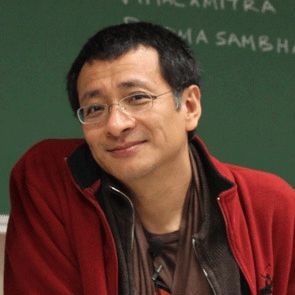
Seattle Buddhist teacher Dzogchen Ponlop Rinpoche has been invited to write a blog for the Huffington Post. His first posting is entitled “The Buddha Wasn’t a Buddhist.” The following is an excerpt from that article.
“If we want to be free of the pain we inflict on ourselves and each other—in other words, if we want to be happy—then we have to learn to think for ourselves. We need to be responsible for ourselves and examine anything that claims to be the truth. That’s what the Buddha did long ago to free himself from his own discontent and persistent doubts about what he heard, day-after-day, from his parents, teachers and the palace priests.
Although he was a prince born into a wealthy and powerful family, the young Siddhartha often just wanted to get away from it all. He wanted the space to think independently about who he was and what the spiritual path was about. Such freethinking was important to the Buddha’s search for inner truth and his ultimate realization of enlightenment. These days more and more people in the West are following the teachings and example of the Buddha. But what are these teachings about? What is Buddhism?
It looks like a religion, but is it? There are many definitions of religion. Some are so broad they’d include your neighborhood garden club. Others are narrower: your garden club would need a deity, enthusiasm for that deity, and a set of beliefs and practices. We all have some sense of what religion means to us, but when we start talking about it—trouble!
If you search “world religions,” you’ll find “Buddhism” on every list. Does that make Buddhism a religion? Does it mean that because I’m a Buddhist, I’m “religious”? I can argue that Buddhism is a science of mind—a way of exploring how we think, feel and act that leads us to profound truths about who we are. I can also say that Buddhism is a philosophy of life—a way to live that maximizes our chances for happiness.
What Buddhism is, at this point, is certainly out of the Buddha’s hands. His teachings passed into the hands of his followers thousands of years ago. They passed from wandering beggars to monastic institutions, from the illiterate to the learned, from the esoteric East to the outspoken West. In its travels, Buddhism has been many things to many people. But what did the Buddha intend when he taught?”
Click here to read the entire article.
When he is not traveling the world leading retreats and lecturing, Ponlop Rinpoche teaches at and works out of Nalanda West, the American Buddhism Center he co-founded in Fremont / Wallingford. He is also the author of several books including his most recent, Mind Beyond Death.
May we all benefit from teachers like Ponlop Rinpoche who devote a great deal of their time to the welfare of their students.
Author : L. Steven Sieden
Source : http://www.examiner.com




